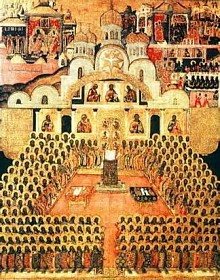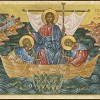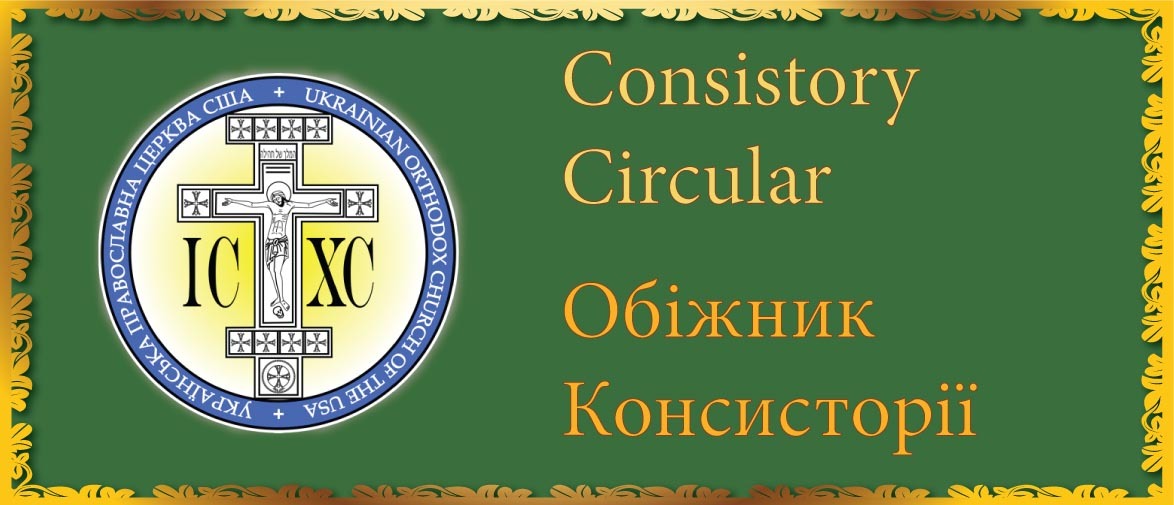Today’s second Gospel Reading, prescribed for the commemoration of the Holy Fathers of the 7th Ecumenical Council, is from the Gospel of St. John:
Jesus spoke these words, lifted up His eyes to heaven, and said: “Father, the hour has come. Glorify Your Son, that Your Son also may glorify You, as You have given Him authority over all flesh, that He should give eternal life to as many as You have given Him. And this is eternal life, that they may know You, the only true God, and Jesus Christ whom You have sent. I have glorified You on the earth. I have finished the work which You have given Me to do. And now, O Father, glorify Me together with Yourself, with the glory which I had with You before the world was. I have manifested Your name to the men whom You have given Me out of the world. They were Yours, You gave them to Me, and they have kept Your word. Now they have known that all things which You have given Me are from You. For I have given to them the words which You have given Me; and they have received them, and have known surely that I came forth from You; and they have believed that You sent Me. I pray for them. I do not pray for the world but for those whom You have given Me, for they are Yours. And all Mine are Yours, and Yours are Mine, and I am glorified in them. Now I am no longer in the world, but these are in the world, and I come to You. Holy Father, keep through Your name those whom You have given Me, that they may be one as We are. While I was with them in the world, I kept them in Your name. Those whom You gave Me I have kept; and none of them is lost except the son of perdition, that the Scripture might be fulfilled. But now I come to You, and these things I speak in the world, that they may have My joy fulfilled in themselves.
When Adam fell, taking all of Creation, and his descendents- all of mankind, all of us, with him, the most devastating result was and continues to be our separation from God. This is true death, eternal death, for without God, Who is the source of all life, there can be no life. But this true death, separation from God, is the death that Christ has trampled down, as we sang throughout the Paschal season, trampling down this true death by His own life-giving death and Resurrection. And by His glorification, that is, His Ascension, He has returned human nature, in the very form of the human body that He bears, to God the Father, granting to us, once again, the possibility of eternal life.
Now, this raises the perennial question: of what does this eternal life consist? What is it? It must be more than sitting around on clouds and playing harps, so, what is it, precisely? In today’s Gospel Reading we hear the answer, from Christ’s own lips: “And this is eternal life, that they may know You, the only true God, and Jesus Christ, Whom You have sent.” Now, I have spoken of this before, but I bring it up again because I believe it is so important that we understand it. Notice that Jesus did not say, “know about You”, or ”know Who You are”, but “know You”, in a direct, personal relationship. This understanding of the nature of the knowledge of God has been a major difference between Orthodoxy and Western Christianity for over 1000 years.
In the West, knowledge of God is understood to be rational, even scholastic. Roman Catholic scholars, such as Thomas Aquinas, played a huge part in the development of the Latin understanding of our relationship with God. In a way, their understanding comes as a result of the “reduced” (from the Orthodox perspective) Western doctrine of the Atonement, in which a simple act of intellectual acceptance, a “choice for Jesus,” acquires for you a blood payment for sin in a once-and-for-all momentary encounter. Christianity itself becomes minimized. One decision, one response to an “altar call”, and you’re done, you’re “saved”. It’s little wonder that the idea of a personal relationship with God has been lost to so many in our society today.
But to the Orthodox, on the other hand, knowledge of God is, and can only be, experiential. Knowledge of God is only gained through the actual experience of God, in a personal relationship, with all of its complexities, and is itself the very definition of eternal life. Of course, this begs the question- how can we know God? How do we experience a personal relationship with Him? Well, the Church teaches us that there are a number of different ways in which we do this. I’ve spoken, in the past, of the importance of personal prayer as one of these ways - the opportunity to commune with the Living God. This morning, I’d like to briefly speak of another way in which we develop our relationship with God - through our service, our ministry to those around us, which is nothing less than the manifestation of our love for Christ. We come to know Christ Jesus, to see His face, in the very people that we serve. And if there was ever a person after whom we should all strive to model ourselves, in terms of service, of ministry unto others, it is surely the Apostle Paul.
Even before his conversion on the road to Damascus and his encounter with the Lord Jesus, Paul had already dedicated his life to serving God. And after his conversion, well, he is one who certainly teaches us what it means to be a disciple of Christ, a Christian, in every sense of the word. As he said, for him, life itself, to live, is Christ, and to die would be a gain, for as long as he remained in the flesh, he was separated from Christ. But he knew that it was not yet his time to die, because there were certain things, certain work that God had given him to do. And, unlike Christ, Who had completed the work entrusted to Him by the Father during His earthly ministry, Paul’s work was not yet complete. So, in order to be as close to Christ as possible while yet in the body, Paul strove to do that work with all of his mind, heart and strength. He gave his entire self, his entire being, to the service of others, because that was what allowed him grow in his relationship with God. And in doing so, the Apostle learned the truth of what Christ said, so many times, and in so many ways: that in the keeping of God’s Commandments, especially the two greatest Commandments, that we love Him and one another, we come to grow in our peronal relationship with God.
A little earlier in His talk to His disciples on the night on which Christ gave Himself up for the life of the world, part of which we heard in today’s Reading, Jesus said, “If anyone loves Me, he will keep My word, and My Father will love him, and We will come to him and make our home with him.” In other words, by obeying Christ we are inviting Him to dwell within us, we make ourselves a suitable place for the King to dwell. But note well that union with Christ is, therefore, not for the nominal believer, not for the one who is a Christian in name only, as so many are. If you are only lukewarm in your faith, you cannot truly love Christ, and you should not expect Him to dwell within you; you should not expect to come to know Him, in that personal relationship that defines eternal life. But if you do truly love the Lord, then you will come to know Him, in the very people that you serve, the very people that you love.
You all know that Jesus said, “No one has greater love that he who gives his life for his friends”. St. Paul, as well as the other apostles, and innumerable saints after them, gave his life, shed his life day after day, forgetting himself, rejecting every thought, every concern about himself, having thought only for those who needed God, those who needed the word of truth, those who needed love. The Apostle Paul lived for others, giving as generously as he had received, for it truly is more blessed to give than to receive. Brothers and sisters, we, too, are called to learn the joy, the exhilarating, incredible joy of giving, of turning away from ourselves to be free to give to others. And of giving on all levels, the smallest things to the greatest things, that we, too, might come to personally know our Creator, our Lord, God and King, in that intimate way that can only arise from His dwelling within us- our hearts and minds and bodies.
So, just how important to you is your personal relationship with God? How important to you is eternal life? Our salvation is important enough to God for Him to become incarnate, to empty Himself and take on the nature of His own creation, the form of a servant, to be humiliated, and tortured, and die for us, so that we might be able to have that personal relationship with Him. I pray, brothers and sisters, that we all find it important enough to commit ourselves to that service, that ministry to all those that God brings into our lives, loving them, because it is that which allows us to experience God, to know Him, and Jesus Christ Whom He has sent, that we, too, may know and experience life eternal, glorifying God:
Father, Son and Holy Spirit, now and ever and to the ages of ages. Amen.
Rev. Gregory Czumak
Four Evangelists Orthodox Mission
Bel Air, MD
|
| |||||||||||||














